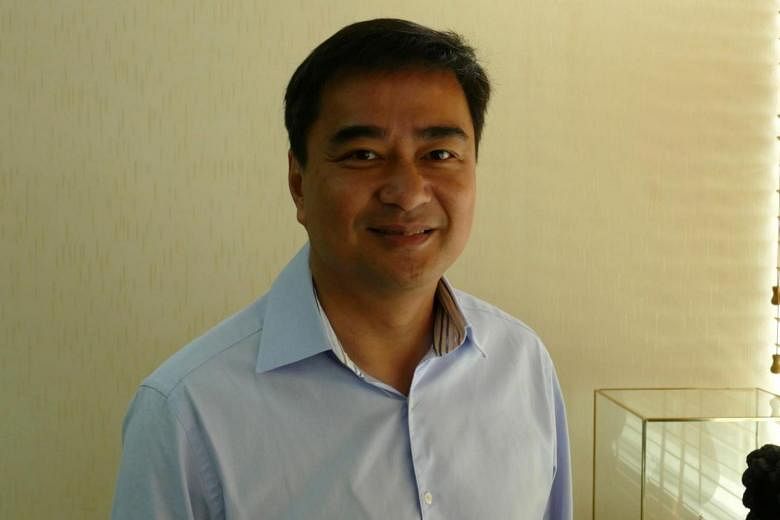BANGKOK (BLOOMBERG) - Thailand's junta leader may seek to retain power after elections scheduled for later this year through support from several different political groups, former Prime Minister Abhisit Vejjajiva said.
Prayuth Chan-Ocha could continue serving as Thailand's prime minister even if he doesn't stand for election, Mr Abhisit said in an interview at his office in Bangkok. The latter option was made possible through the military-backed constitution, the country's 20th, which was ratified last year.
"He's certainly not closing the doors to any possibilities," said Mr Abhisit, without saying how he knew the information.
Mr Abhisit currently leads the Democrat party, which was the second-largest in parliament before General Prayuth seized power in a 2014 coup.
Mr Abhisit's comments reflect a growing perception in Thailand that the military will seek to retain influence in South-east Asia's second-biggest economy even after the country holds an election. The current stretch of military rule is one of the longest since the 1970s in a country with a history of coups since the end of absolute monarchy more than eight decades ago.
Mr Prayuth's administration has sought to spur infrastructure investment and encourage the development of advanced industries to help bolster an economy reliant on exports and tourism. Economic growth in the third quarter reached the fastest pace since early 2013, while stocks recently hit a record high amid a global rally in equities.
Earlier this month, Mr Prayuth stated he was no longer a soldier but a politician, a comment which made headlines as it was the first time he admitted to being a political figure since the military takeover.
"Prayuth has the approach of a soldier and is concerned with returning stability to the country," government spokesman Sansern Kaewkamnerd said when asked whether Mr Prayuth will seek to stay on as prime minister.
"An election is a matter of the future, which should be handled in the future," Mr Sansern added. "If the question is whether he's interested in running in elections, in my personal opinion he probably isn't as it's a matter of politics and up to the people."
"Now he's comfortable to say that he is a politician," Mr Abhisit said of Mr Prayuth. "I guess he's signaling that he's leaving the door open for continuing his political career."
A push by Mr Prayuth to stay in office would particularly impact Mr Abhisit's party, which hasn't won a majority in a nationwide vote since 1992. Many members of his Democrat party have supported efforts by the military and courts to remove former Prime Minister Thaksin Shinawatra and his allies from power.
The Oxford-educated Mr Abhisit was picked by legislators to become prime minister in December 2008 after a court dissolved the pro-Thaksin ruling party for election fraud. He later oversaw a military crackdown against Thaksin supporters in 2010 that left about 90 people dead.
According to the constitution, both houses of parliament can decide to consider an outside candidate as prime minister if the 500-member lower house fails to approve its nominee for the post. An outside candidate would then need a majority of support in the combined National Assembly. The junta appoints all 250 senators in the upper house.
Mr Abhisit said that it's "widely expected" that three or four new political parties will form with the goal of bringing in Mr Prayuth as an outsider candidate. The most prominent leader he mentioned is Suthep Thaugsuban, a former member of Mr Abhisit's party who was an influential power broker in its southern stronghold. Efforts to reach Mr Suthep were unsuccessful.
Another name mentioned by Mr Abhisit was Deputy Prime Minister Somkid Jatusripitak, who helps oversee the economy. Nuttaporn Jatusripitak, adviser in the prime minister's office, said: "Dr Somkid has denied allegations of forming his own party to Thai media before."
Mr Abhisit also cited former senator Paiboon Nititawan, who has already announced plans to set up a party supporting Mr Prayuth. Reached by phone, Mr Paiboon confirmed that he's in discussions to form a new political party.
"One of the main objectives for this party is to support the honest and capable man to be the country's prime minister," Mr Paiboon said. "Mr Prayuth is among the most appropriate persons who we think are qualified to continue as the country's prime minister."
Mr Prayuth signed an executive order in Dec easing restrictions for new political parties to organise prior to the elections. Existing parties are still banned from any political activity and have 30 days in April to assemble and submit relevant documentation to confirm their memberships.
Mr Abhisit said the rules put an "unreasonable burden" on established political parties. Still, he was optimistic that civilian leaders would prevail after the election.
"Even with the way the constitution is designed, it isn't that easy for an outsider - for the current regime - to be able to hang on," he said.

